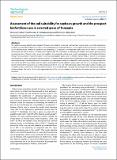| dc.contributor.author | Nakei, Monica | |
| dc.contributor.author | Venkataramana, Pavithravani | |
| dc.contributor.author | Ndakidemi, Patrick | |
| dc.date.accessioned | 2024-01-29T08:33:17Z | |
| dc.date.available | 2024-01-29T08:33:17Z | |
| dc.date.issued | 2023-10-19 | |
| dc.identifier.uri | https://doi.org/10.48130/TIA-2023-0011 | |
| dc.identifier.uri | https://dspace.nm-aist.ac.tz/handle/20.500.12479/2447 | |
| dc.description | This research article was published in the Technology in Agronomy Volume 3, Article number: 11, 2023 | en_US |
| dc.description.abstract | The rapidly increasing global human population threatens the availability of safe and nutritious food. Among others, soil fertility degradation, insufficient use of proper fertilizers and scanty soil characterizations have major contributions in lowering the productivity of crops. To ensure the use of sufficient proper fertilizers for optimum crop productivity, it is important to evaluate the fertility status of soil which is a vital tool in deciding the type and the amount of fertilizer to be supplemented. This study aimed at evaluating soil fertility in the soybean growing and the non growing areas of Tanzania and to assess their suitability for growing the soybean crop as well as prospective use of rhizobia biofertilizers through the assessment of nodule formation in non-inoculated soybean plants grown in different farmers' fields. A total of 81 soil samples including those in soybean growing and non growing areas of Tanzania, were evaluated in terms of their fertility status through different physico-chemical parameters. From each field, three healthy plants with intense green leaves were selected for nodule counting. The study indicated that, most of the soils (85%) have medium acidic to neutral soil pH with 58% having sufficient organic carbon and 78% at risk of nitrogen deficiency. Soil pH, total N and OC had significant (p < 0.05) correlations (r) of 0.14, −0.22 and −0.27 with nodule number. The higher number of nodules were in medium acidic to neutral soils, with the highest number, 8.82 in neutral pH soils, indicating the favorability of the particular pH ranges for rhizobia activities. The results of this study suggest that most of the soils are suitable for the production of soybean and the use of rhizobia inoculants. | en_US |
| dc.language.iso | en | en_US |
| dc.publisher | Maximum Academic Press | en_US |
| dc.subject | Nodules | en_US |
| dc.subject | Rhizobia inoculants | en_US |
| dc.subject | Soil fertility | en_US |
| dc.subject | Symbiotic nitrogen fixation | en_US |
| dc.title | Assessment of the soil suitability for soybean growth and the prospect biofertilizers use in selected areas of Tanzania | en_US |
| dc.type | Article | en_US |

